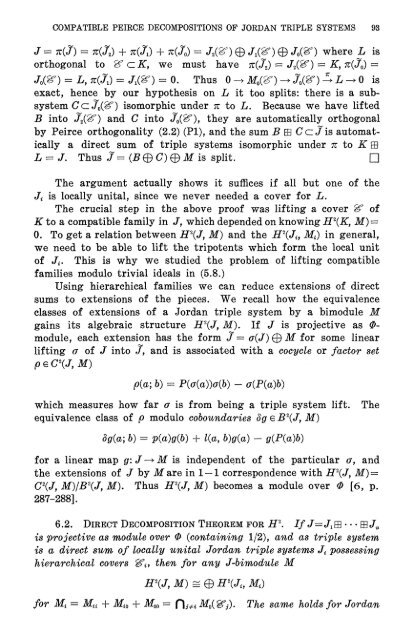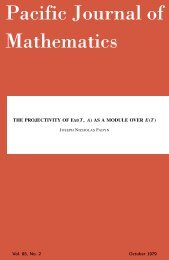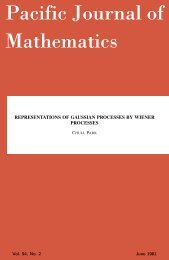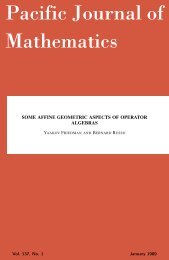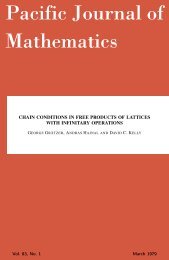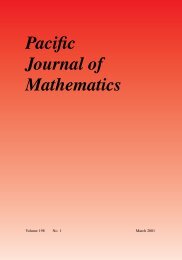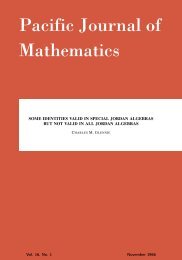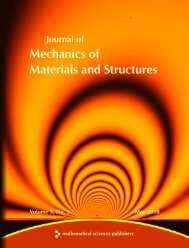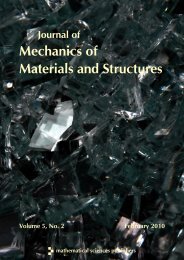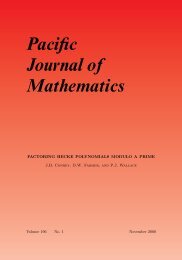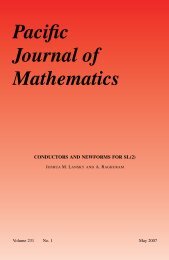Compatible Peirce decompositions of Jordan triple systems - MSP
Compatible Peirce decompositions of Jordan triple systems - MSP
Compatible Peirce decompositions of Jordan triple systems - MSP
Create successful ePaper yourself
Turn your PDF publications into a flip-book with our unique Google optimized e-Paper software.
COMPATIBLE PEIRCE DECOMPOSITIONS OF JORDAN TRIPLE SYSTEMS 93<br />
/ = π(j) = π(j 2) + π(j x) + π(j 0) = JJ&) φ jj&) 0 j o(gf) where L is<br />
orthogonal to %f cK, we must have π(J 2) = / 2(^) = ^, ^(Λ) =<br />
J 0(gf) = L, π(J γ) = J^gf) = 0. Thus 0->ikf o(g 7 )-^/ o(^)-^ ί'->0 is<br />
exact, hence by our hypothesis on L it too splits: there is a subsystem<br />
CaJ 0(&) isomorphic under π to L. Because we have lifted<br />
I? into J^^) and C into J o(&), they are automatically orthogonal<br />
by <strong>Peirce</strong> orthogonality (2.2) (PI), and the sum B ffl CcJis automatically<br />
a direct sum <strong>of</strong> <strong>triple</strong> <strong>systems</strong> isomorphic under π to K S3<br />
L = J. Thus J = (5 0 C) © M is split. •<br />
The argument actually shows it suffices if all but one <strong>of</strong> the<br />
Ji is locally unital, since we never needed a cover for L.<br />
The crucial step in the above pro<strong>of</strong> was lifting a cover £? <strong>of</strong><br />
if to a compatible family in J, which depended on knowing H\K, M) =<br />
0. To get a relation between H\J f M) and the H\J i9 Λf 4) in general,<br />
we need to be able to lift the tripotents which form the local unit<br />
<strong>of</strong> Ji. This is why we studied the problem <strong>of</strong> lifting compatible<br />
families modulo trivial ideals in (5.8.)<br />
Using hierarchical families we can reduce extensions <strong>of</strong> direct<br />
sums to extensions <strong>of</strong> the pieces. We recall how the equivalence<br />
classes <strong>of</strong> extensions <strong>of</strong> a <strong>Jordan</strong> <strong>triple</strong> system by a bimodule M<br />
gains its algebraic structure H\J, M). If J is protective as Φmodule,<br />
each extension has the form J = σ(J) φ M for some linear<br />
lifting a <strong>of</strong> J into J, and is associated with a cocycle or factor set<br />
peC\J,M)<br />
p(a; b) = P(σ{a))σ(b) - σ(P(a)b)<br />
which measures how far σ is from being a <strong>triple</strong> system lift. The<br />
equivalence class <strong>of</strong> p modulo coboundaries δg e B 2<br />
(J, M)<br />
Sg(a; b) = p(a)g(b) + Z(α, b)g(a) - g(P(a)b)<br />
for a linear map g:J-+M is independent <strong>of</strong> the particular a, and<br />
the extensions <strong>of</strong> J by Mare in 1 — 1 correspondence with H\J, M) =<br />
C 2<br />
(J, M)/B 2<br />
(J, M). Thus H\J, M) becomes a module over Φ [6, p.<br />
287-288].<br />
6.2. DIRECT DECOMPOSITION THEOREM FOR H\ IfJ=J ι m--mJ n<br />
is protective as module over Φ (containing 1/2), and as <strong>triple</strong> system<br />
is a direct sum <strong>of</strong> locally unital <strong>Jordan</strong> <strong>triple</strong> <strong>systems</strong> Ji possessing<br />
hierarchical covers $? if then for any J-bimodule M<br />
H\J, M) s Θ H\J i9 Mi)<br />
for Mi = M u + M ί0 + Moo = f\ jΦi M 0(8 7<br />
i) The same holds for <strong>Jordan</strong>


